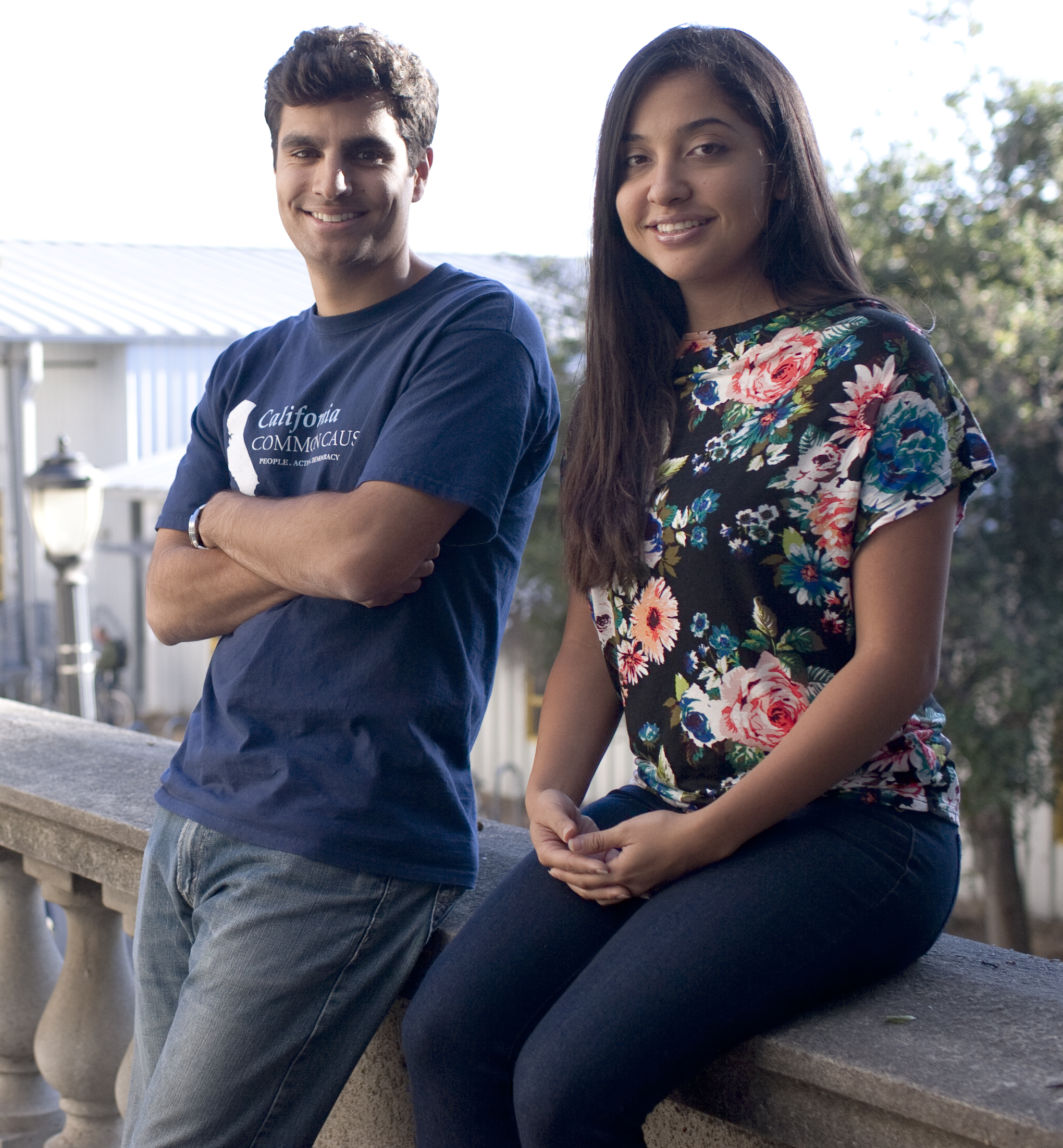Q&A: Student Regent Jonathan Stein, Student Regent-designate Cinthia Flores discuss upcoming year

UC Student Regent Jonathan Stein and Student Regent-designate Cinthia Flores sit outside the student regent’s office at UC Berkeley on Sept. 14.
By Emily Suh
Sept. 23, 2012 8:20 a.m.
Student Regent Jonathan Stein and Student Regent-designate Cinthia Flores attended the bimonthly University of California Board of Regents meeting held at UC San Francisco Sept. 11-13. They sat down with Daily Bruin reporter Emily Suh afterward to discuss their plans for the upcoming year and the University’s funding gap.
Daily Bruin: What is the role of the student regent and the student regent-designate?
Jonathan Stein: The student regents are the student representatives on the UC Board of Regents. You take student concerns … to the highest-level decision-makers within the University. Then … you ask difficult questions, you get answers … and you put it in the hands of students who want to mobilize around it. The student regent is not meant to solve every student’s problems, but the student regent can use the unique access and influence that comes with the position to empower students to better solve their own problems themselves and to better speak on their own behalf.
Cinthia Flores: If a student regent-designate is doing their job appropriately, they’re basically using this first year as a year of learning the responsibilities of the job, assisting the student regent in his or her plan of action and preparing for the following year when he or she becomes the student regent.
DB: What’s it like being a student regent? How do you balance school and your other priorities?
CF: I think any of our given days starts with waking up, going to class, in between class going to either meet with administrators, students, faculty, staff on campus, maybe grabbing lunch a little bit, going on some conference call or two, going back to class, and spending the rest of the night sending emails, writing some memos, and finally trying to do some homework ““ then get up and do it all over again.
JS: Being a student regent is a full-time job, and (the job) can make it difficult to perform the roles of being a regular student. It’s really important that you have friends and families who can support you and other student leaders who have similar demands and restraints on their times.
DB: How would you frame the University’s current and imminent financial situation?
JS: If (Proposition) 30 fails, the University will be cut $250 million dollars, and it will also not receive a $125 million tuition buyout. Plus, we have several hundred millions of dollars in cost increases that are simply mandatory. And what that means is that we have a budget deficit. In the next year, that amounts to several hundred million dollars, and we have a budget deficit over the next five years that’s well over a billion dollars. The No. 1 way to generate revenue for the (UC) is to generate revenue from the state. And the No. 1 way we can generate revenue from the state … is for Proposition 30 to pass.
DB: At the September regents meeting, UC officials discussed new strategies to generate new revenue. The University has had a budget gap for some time now. Are students right to be frustrated at the lateness of this conversation?
JS: I know that students have been calling on regents to do creative, outside-the-box thinking for well over a year, and I don’t think we’ve seen them in the past. … But at the September meeting, we saw truly outside-the-box thinking. I give the (UC) Office of the President credit for bringing these ideas forward, but I do feel … it is totally legitimate to criticize them for not bringing (those ideas) forward before.
DB: What do you plan to accomplish this school year in your capacity as student regents?
JS: I am helping lead a year-long review on how we handle (professional) school tuition. And because our law schools and business schools are now charging $50,000 or more and our (professional) school students are, in a lot of instances, graduating with $150,000 in debt. There is a policy in place that should be governing these fees and it is not working. Second, I am working on enabling the University to play a more effective role in Sacramento. I am also helping lead a systemwide student work group on campus climate issues … which surround issues around inclusion and diversity. Lastly, I’ll be partnering with (the UC Student Association) in an effort to increase student representation on the Board of Regents. We’ve shifted our focus to pushing for student participants on each regent committee rather than (having more) student regents, which requires a constitutional amendment.
CF: I want to focus on evaluating the current admission process that has been undertaken by all the UC campuses, evaluate their effectiveness and (figure out) the areas that we feel should be worked upon to yield the kind of diversity that we want ““ in particular at our most selective campuses. Additionally, I will be working with the UC Office of the President in evaluating our financial aid model: whether or not it’s working, what’s the long-term trajectory of financial aid, and how we can have a system that can ensure that students that are low-income, middle-income or higher-income have the means necessary to have an affordable experience at the University. And lastly, I will probably be working a lot to ensure that the student voice and student perspective and support for Proposition 30 are well-represented across campuses. We will also solicit the support of community organizations.
Email Suh at [email protected].


